Christ has ascended!
“When You had fulfilled the dispensation for our sake, and united earth to heaven: You ascended in glory, O Christ our God, not being parted from those who love You, but remaining with them and crying: “I am with you and no one will be against you!” (Tone Six
This series of Posts is directed to those who understand that they will not live on earth forever.
Suppose I knew that I could no longer stay here in Wisconsin, that I will go permanently to, say, California – over the horizon from here. And suppose my only two choices there would the High Sierra or Death Valley. I would want to know what these places are like, would I not? so I could choose the right one, and carefully follow the map to get me there.
Two weeks ago, we saw how Our Lord Jesus Christ told us what life is like in that Place which He has prepared for us *, but almost nothing about the Place itself.
- He told us a lot about the other place, and once passed through there Himself.
Last week, Saint John in his Revelation went further and described the Holy City, the New Jerusalem.
This week we’ll look at Saint Ephraim of Syria’s Hymns on Paradise, in which he describes the Holy Mountain of Paradise.
Saint Ephraim of Syria
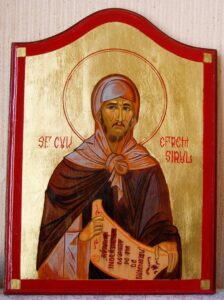
Orthodox know him because of his prayer, recited in our services and devotions each weekday of Great Lent which begins: “O Lord and Master of my life…” I hope we know the prayer by heart.
by an anonymous Orthodox nun from near Gradea in France, 2005 (Creative Commons license)
Saint Ephraim was born in about 306 in Nisibis * in far eastern Syria, then part of Mesopotamia, a newly acquired province of the great Roman Empire. He became a monk, then was ordained Deacon, living in strict, even severe asceticism. He was a man immersed in prayer. He supported the Fourth Ecumenical Council. He was a prolific writer – sermons, theological tracts, hymns – and encouraged women to sing in choir. Ephraim founded the School of Nisibis, which for centuries was the center of learning in the Church of the East. When the Persians took Nisibis, most Christians fled west. Ephraim went to Edessa, just over the border into the Roman Empire, where he continued his writing. When plague broke out, Ephraim left his cell and ministered to the sick till he died of exhaustion. He was in his 70s. He is commemorated on January 28.
- It’s now “Nusaybin” in Turkey. The last Christians there were massacred in 1915.
Hymns on Paradise
Hymns are intended to be sung. We miss much when we only read them. I wish we knew their tunes.
What sort of writing was this? These Hymns 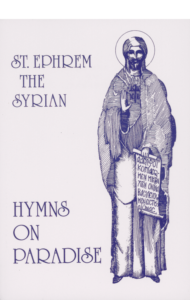 are grounded in traditional (mostly Scriptural) sources – Mount Sinai, Mount Zion and so on. Ephraim says this was not a heavenly vision, but it is obviously more than just rational speculation. Perhaps it could be called an intellectual mystical contemplation, even “exploration”. The Orthodox East has more ways of “seeing” than our Western world knows.
are grounded in traditional (mostly Scriptural) sources – Mount Sinai, Mount Zion and so on. Ephraim says this was not a heavenly vision, but it is obviously more than just rational speculation. Perhaps it could be called an intellectual mystical contemplation, even “exploration”. The Orthodox East has more ways of “seeing” than our Western world knows.
In this limited space, I hope to give you at least the “feel” of Paradise. If you’re inspired to read more, the book is available from Saint Vladimir’s Seminary Bookstore (svspress.com). The following passages are included here by their permission.
Dear ones, this is lovely. Don’t rush through it. Take some time. Put your heart and mind and soul into it, and try to “see” with Saint Ephraim. It is comforting, hopeful, inspiring, even exciting.
How Saint Ephraim “saw”
Joyfully did I embark on the tale of Paradise – a tale that is short to read but rich to explore. My tongue read the story’s outward narrative, while my intellect took wing and soared upward in awe as it perceived the splendor of Paradise – not indeed as it really is, but insofar as humanity is granted to comprehend it. (Hymn 1.2)
Scripture brought me to the gates of Paradise, and the mind, which is spiritual, stood in amazement and wonder as it entered; the intellect grew dizzy and weak and the senses were no longer able to contain its treasures – so magnificent they were – or to discern its savors and find any comparison for its colors, or take in its beauties so as to describe them in words. (Hymn 6.2)
If someone concentrates his attention solely on the metaphors used of God’s majesty, he abuses and misrepresents that majesty, and thus errs… and is ungrateful to that Grace which stooped low to the level of his childishness… (11.6)
…Paradise has … clothed itself in terms that are akin to you… not because it is impoverished.. rather your nature is far too weak to be able to attain to its greatness, and its beauties are much diminished by being depicted in the pale colors with which you are familiar. (11.7)
…feeble eyes cannot gaze upon the dazzling sight of its celestial beauties; [so] it has clothed its trees with the names of the trees we know. (11.8)
The Holy Mountain
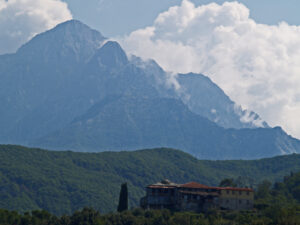
Mount Athos
With the eye of my mind I gazed upon Paradise. The summit of every mountain is lower than its summit, the crest of the Flood reached only its foothills; there it kissed with reverence before turning back… (1.4)
Not that the ascent to Paradise is arduous because of its height, for those who inherit it experience no toil there. With its beauty it joyfully urges on those who ascend. Amidst glorious rays it lies resplendent, all fragrant with its scent; magnificent clouds fashion the abodes of those who are worthy of it. (1.5)
Our Lord said “In My Father’s House are many rooms”. Saint Paul went to the “Third Heaven. Just so here:
…He allots the foothills to the most lowly, the slopes to those in between, the heights to the exalted… there being sufficient levels in Paradise for everyone: the lowest parts for the repentant, the middle for the righteous, the height for those victorious, while the summit is reserved for God’s Presence. (2.11)
Reflecting the Church’s experience with the saints:
From their abodes the children of light descend, tney rejoice in the midst of the world where they had been persecuted; they dance on the sea’s surface and do not sink, for Simon, although a Rock did not sink. Blessed is he who has seen, together with them, his beloved ones. (1.6)
The Holy Mountain “calls us” to itself:
Blessed is he for whom Paradise yearns. Yes, Paradise yearns for the man whose goodness makes him beautiful; it engulfs him at its gateway… but if there is someone it abhors, it removes him and casts him out; this is the gate of testing that belongs to Him who loves mankind. (2.1)
Forge here on earth and take the key to Paradise, the Door that welcomes you, smiles radiantly upon you… (2.2)
The New Eden

Who is capable of gazing upon the Garden’s splendor, seeing how glorious it is in all its design, how harmonious in its proportions, how spacious for those who dwell there, how radiant with its abodes? Its fountains delight with their fragrance… (2.8)
God planted the fair Garden, He built the pure Church upon the Tree of Knowledge. In the Church He implanted the Word which causes rejoicings with its promises, which causes fear with its warnings: he who despises the Word perishes, he who takes warning, lives. (6.7)
As for that part of the Garden, my beloved, which is situated so gloriously at the summit of that height where dwells the Glory, not even its symbol can be depicted in man’s thought; for what mind has the sensitivity to gaze upon it, or the faculties to explore it, or the capacity to attain to that Garden whose riches are beyond comprehension. (3.1)
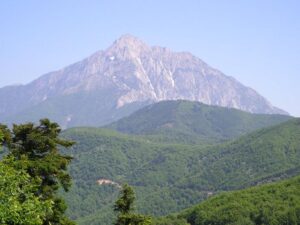
Mount Athos
Peter Brubacher, licensed at Creative Commons
Life in Paradise
Paradise delighted me as much by its peacefulness as by its beauty; in it there resides a beauty that has no spot; in it exists a peacefulness that has no fear. How blessed is that person accounted worthy to receive it, if not by right, yet at least by grace; if not because of good works, yet at least through mercy. (5.12)
I learned how, compared to Paradise, our abode is but a dungeon; yet the prisoners within it weep when they leave it! (5.13)
I was amazed at how even infants weep as they leave the womb – weeping because they come out from darkness into light and from suffocaton the issue birth into this world! Likewise death, too, is for the world a symbol of birth, and yet people weep because they are born out of this world, the mother of suffering, into the Garden of splendors. (5.14)
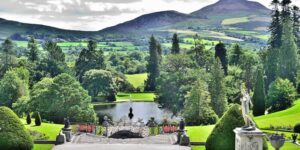
Have pity on me, O Lord of Paradise, and if it is not possible for me to enter Your Paradise, grant that I may graze outside, by its enclosure; within, let there be spread the table for the “diligent”, but may the fruits within its enclosure drop outside the “crumbs” for sinners, so that through Your grace they may live! (5.15)
The Righteous Ones
Paradise took me up and cast me into a sea still greater; in its fair beauty I beheld those who are far more beautiful than it… (6.5)
Paradise surrounds the limbs with its many delights; the eyes, with its handiwork, the hearing with its sounds, the mouth and nostrils with its tastes and scents. Blessed is that person who has gathered for himself the company of all who have kept vigil and fasted; they, in return for their fasts, shall delight to graze upon its luxurious pastures. (6.3)
The assembly of saints bears resemblance to Paradise… (6.8)
Among the saints none is naked, for they have put on Glory… (6.9)
More fitting to be told than the glorious account of Paradise are the exploits of the victorious who adorned themselves with the very likeness of Paradise. (6.14)
Both men and women are clothed in raiment of light… (7.5)
There youth exults because of what it has achieved. (7.6)
There the married state finds rest after having been anguished by the pangs of giving birth, brought on by the curse, and by the pain of childbearing; now it sees the children whom it had buried amid laments, pasturing like lambs in Eden… (7.8)
Thanks be to the Merciful One who plucked them while still young – to become in Paradise the first fruits of all. (7.9)
Bind up your thoughts, Old Age, in Paradise, whose fragrance makes you young; its wafting scent rejuvenates you, and your stains are swallowed up in the beautify with which it clothes you. (7.10)
People behold themselves in glory and wonder at themselves, discovering where they are. The nature of their bodies, once troubled and troublesome, is now tranquil and quiet… (7.12)
In Paradise the cripples who had never walked leap around; the deformed, who had never even crawled, fly about through the air; the eyes of the blind and deaf, who had yearned from the womb, hungering for the light which they failed to see, now rejoice to behold the beauty of Paradise, and the mighty sound of its harps gives comfort to their ears. (7.13)
Nothing there in Paradise is useless… (7.21)
None toil there, nor none go hungry there; none endure shame there, for none do wrong there; none feel contrition there, for there is no cause to repent there. Those who run the course find rest and quiet. None grow old there, for none die there; none are buried there, for none are born there. (7.22)
They know no worry, for they have no suffering; they have no fear, for no snare awaits them; they have no adversary, for they have passed through the contest. They count themselves blessed unendingly, for their warfare is over; they have taken up their crowns and found rest in their new Abode. (7.23)
I saw that place, my brethren, and I sat down and wept; for myself and for those like me, at how my days have reached their fill, dissipated one by one, faded out, stolen away without my noticing; remorse seizes hold of me because I have lost crown, name and glory, robe and bridal chamber of light… (7.24)
In the evening the world sleeps, closing its eyes, while it the morning it arises. He who repays is distant as it were but a night’s length away; now light dawns and He is coming. Weary not, my brethren, nor suppose that your sturggle will last long, or that your resurrection is far off, for our death is already behind us, and our resurrection before us. (7.2)
We’ve no room here for Saint Ephraim’s detailed description of the climate of Paradise – the seasons range from very pleasant to extremely pleasant! with each month producing fruits which almost pick themselves for us – and much else, especially his Old Testament explorations.
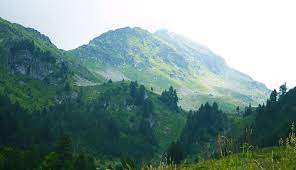
Mount Athos
Let not this description of [Paradise] be judged by one who hears it, for descriptions of it are not at all subject to judgment, since, even though it may appear terrestrial because of the terms used, it is in its reality spiritual and pure. (11.3)
For him who would tell of it there is no other means but to use the names of things that are visible, thus depicting for his hearers a likeness of things that are hidden. (11.5 )
All this and similar things that I have read in the Scriptures, have helped depict in my mind that Garden of Life. Blessed is the person who is worthy to attain its enjoyment. May the Merciful One bring me to its fruits, may their taste give me life, or their scent strike me, or their radiance reach me, or their dew bathe me. (15.17)
“By a flood of tears you made the desert fertile, and your longing for God brought forth fruits in abundance. By the radiance of miracles you illumined the whole universe! Our Father Ephraim, pray to Christ God to save our souls!” Tone Eight
Next Week: C.S. Lewis on Heaven. Surely he had read Hymns on Paradise.